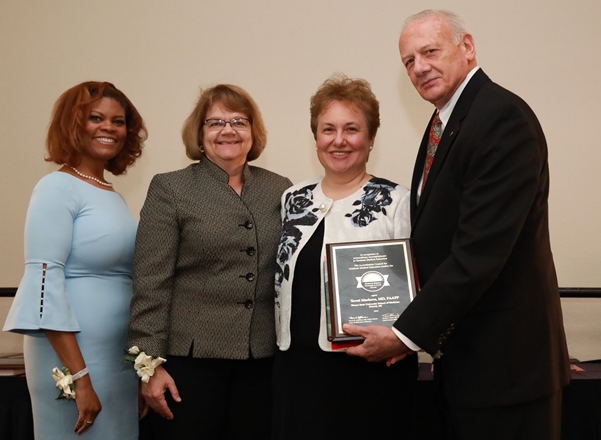
From left: Accreditation Council for Graduate Medical Education Awards Program Liaison DeLonda Dowling; ACGME Board Director and Chair of the Awards Committee Diane M. Hartmann, M.D. (University of Rochester School of Medicine and Dentistry), WSU's Tsveti Markova, M.D., and ACGME President and CEO Thomas J. Nasca, M.D., M.A.C.P.
The Wayne State University School of Medicine has achieved the maximum continued accreditation status awarded by the Accreditation Council for Graduate Medical Education for a Sponsoring Institution, with no citations and a commendation.
WSU's Office of Graduate Medical Education was established in 2007, the same year WSU was named a Sponsoring Institution for residencies and fellowships. WSU was awarded Continuous Accreditation status in May 2012 without any citations and a commendation for substantial compliance with ACGME requirements. Since then, all subsequent reviews from the ACGME's Institutional Review Committee have led to the highest possible accreditation status.
"The School of Medicine should be very proud of this accomplishment of the Medical Education leadership, the GME team, all program directors and coordinators, as well as for maintaining strong relationships with our community hospital partners," said Designated Institutional Official Tsveti Markova, M.D., professor and chair of the Department of Family Medicine and Public Health Sciences. "I am especially grateful to Dean Jack D. Sobel, M.D., and Vice Dean of Medical Education Richard Baker, M.D., for their continued support of GME."
The office's mission is to lead and oversee innovative graduate medical education programs in which physicians in training develop personal, clinical and professional competence to provide exceptional patient care. The School of Medicine sponsors 10 residency programs, all of which are filled for the next class of first-year residents starting in July, following the National Resident Matching Program's Match Week held Match 12-16.
The ACGME also awarded Dr. Markova the Parker J. Palmer Courage to Lead Award at the ACGME's annual Educational Conference this month in Orlando, Fla.
The award honors designated institutional officials who demonstrate excellence in improving performance and innovation; supporting program directors and residents; showing strong leadership, values and principles; and dedication to the education improvement process. As the DIO, Dr. Markova provides oversight of the residency programs for compliance with institutional and ACGME standards, and establishes and implements policies for improving quality of education and work environments. In this process, she actively engages hospital partners in reaching the highest standards of medical education.
In the last year, the office has boosted its commitment to innovative programming, including sponsorship and support of resident-led ideas to encourage resident growth and a better work/life balance. The effectiveness of each idea is measured by WSU's Resident Wellness Scale, used in all WSU residency programs, including Family Medicine.
GME also teamed up with the school's Office of Teaching and Learning to create Developing Active Resident Teachers, or DART, a four-phase, certificate-based educational initiative for residents at all training levels who wish to develop their teaching skills, work to improve their program curriculum and contribute to academic medicine. Since their creation last year, the Resident Wellness Scale and DART have been adopted by other educational institutions and health systems nationally.
And, through its affiliation with the Michigan Area of Health Education Center and the MIDocs Consortium, the office has been instrumental in advocating for expanded GME opportunities in the state, including more residency slots and needed funding to combat a projected physician shortage.
Many of the WSU residency programs recently designed and implemented an intensive scholarly activity curriculum. The residents received didactics on various scholarship topics, including quality improvement. The QI didactic was adapted from modules from the Institute for Healthcare Improvement website. The "Plan, Do, Study, Act Cycle" tested changes in the work setting, exposing residents to experiential learning. Residents assembled interdisciplinary QI teams to complete their cycle. Family Medicine QI topics included follow-up rates for hypertension management in a primary care setting, and measuring and improving knowledge of indications for ordering and discontinuing isolation precaution.